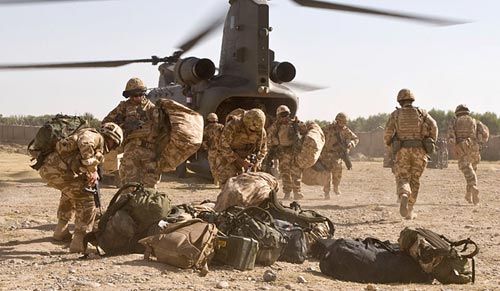Defence Secretary Philip Hammond yesterday published the white paper ‘Reserves in the Future Force 2020: Valuable and Valued’, which sets out the plans to sustain and grow our Reserve Forces to 35,000 across all 3 services by 2018 by revitalizing them, reversing the decline of the recent past, growing their trained strength, and investing an additional £1.8 billion over 10 years.
The white paper marks a significant step forward as we change our relationship with reservists, their families and employers; dramatically improving what we offer them. Reserves make an essential contribution to national security. In future their contribution to our defence capability will increase; they will become an integrated part of the Whole Force required for almost all operations, both at home and abroad.
Included in the raft of new measures is the pledge that small companies will soon get financial help if they employ and support a reservist. We seek an open relationship tailored to meet the needs of different sizes and types of employers, based on predictability of reservist training and deployment and mutual benefit. This will include working together to accredit the skills and training reservists gain during service with recognized civilian qualifications. We will also introduce a National Relationship Management Scheme by April 2014 made up of leading supportive employers from the public and private sector.
For reservists we are investing in high quality training, increasing their pay through a paid annual leave entitlement, introducing access to the Armed Forces Pension Scheme, providing more modern equipment, and giving them better access to welfare support and health services. We are working to introduce new legislation through the Defence Reform Bill to use Reserves for the full range of tasks our Armed Forces may be asked to undertake, and renaming the Territorial Army the ‘Army Reserve’ to reflect the significant changes to its role and full integration. We are also working to provide reservists with additional protection by direct access to an employment tribunal (exempt from the two-year qualifying period) where they have been unfairly dismissed due to their service.
Several business organizations were supportive of yesterday’s announcement. Speaking on Sky News, Mike Cherry from the Federation of Small Businesses said: “Most of our members are very supportive of this, but about a third say they cannot support what the government intends to do. We look forward to seeing what Philip Hammond has to say about support for businesses. Reserve Forces seem to go through boom-and-bust cycles on numbers and equipment. Most small businesses who are able to support reservists will try and do what they need. There are employment law issues around this. I was a reservist for 5 years, but business had to take over in the end. But it was a great time and people should look forward with pride to serving their country.”
Dr Neil Bentley, CBI Deputy Director-General, said: “Businesses across the UK recognize the importance of national security, and the role the Armed Forces play in keeping us safe. Future Force 2020 will significantly increase the number of reservists in the workforce and require an additional commitment from businesses. We’re pleased the MOD has listened to businesses’ concerns, in particular the need to work in partnership with firms, rather than taking a purely legalistic approach, to minimize any potential disruption.
“We particularly welcome the plans for improved communications and the additional financial support to smaller businesses announced in the white paper. Alerting businesses earlier about mobilization will make things easier and a single point of contact for employers is a real step forward. But the government must work hard with businesses and ensure the transition to this new approach is as smooth as possible.”
Sir Mike Rake, Chairman of BT, said: “BT has supported reserve service for many years. It’s a win-win for individual, employer and armed services through skills, leadership and team work development. Deepening this 3-way bond though closer employer engagement, mutual skills accreditation and effective advance planning on mobilization is central to the white paper proposals, not least for working with SMEs [small and medium-sized enterprises]. This will be a multi-year task to get it right.”
Paul Everitt, Chief Executive of Defence Trade Organization ADS, said: “The Defence Secretary has described UK defence companies as some of the ‘strongest and most effective’ supporters of the Reserve Forces. Industry recognizes the increased role of reservists set out in the white paper and is working with government to deliver the flexible force needed to best support our Armed Forces. It is important that the MOD works closely with local businesses to deliver a transparent and predictable deployment process and to ensure companies can continue to provide support to employees serving in the Armed Forces.”











